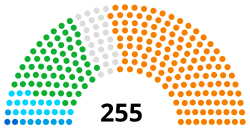National Assembly of Côte d'Ivoire
|
National Assembly Assemblée nationale |
|
|---|---|
| Parliament of Ivory Coast | |
 |
|
| Type | |
| Type | |
| Leadership | |
|
President
|
|
| Structure | |
 |
|
|
Political groups
|
Non-partisan
|
| Elections | |
| First past the post | |
|
Last election
|
18 December 2016 |
| Meeting place | |
 |
|
| Le Plateau, Abidjan | |
| Website | |
| www |
|
Non-partisan
The National Assembly is lower house of the Parliament of Ivory Coast since November 2016. From 1960 to 2016, The National Assembly was Ivory Coast's unicameral legislative body. Evolved from semi-representative bodies of the French Colonial period, the first National Assembly was constituted on 27 November 1960 with 70 elected member (députés) in accordance with the Constitution of 31 October 1960, which created the First Republic.
Legislative power in Ivory Coast is exercised by Deputies elected from Constituencies (Circonscriptions) by a Scrutin de Liste or Plurality-at-large voting which has neither a proportional representation or panachage element common in many such systems. The powers of this Assembly expire at the end of its second regular session (session ordinaire) in the fifth year of its mandate. The Assembly is then reformed by election from candidates who must be Ivorian citizens of 25 years or older who have never renounced their Ivorian nationality.
The first National Assembly of the Second Republic of Ivory Coast elected for the period 2000–2005 was marked by both internal political crisis and the Ivorian Civil War. No elections were held in 2005, but with the peace deal ending the Civil War, elections are expected on 30 November 2008.
The 2011 Ivorian parliamentery election was dominated by the Rally of the Republicans, the party of President Alassane Ouattara, followed by the Democratic Party of Côte d'Ivoire – African Democratic Rally. The current National Assembly is made up of 255 elected officials, with Guillaume Kigbafori Soro (RDR) as the current president.
...
Wikipedia
